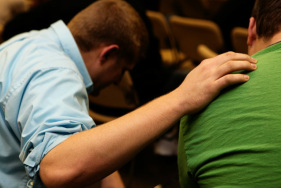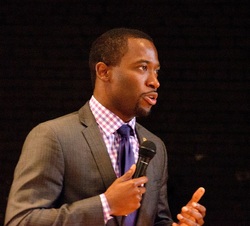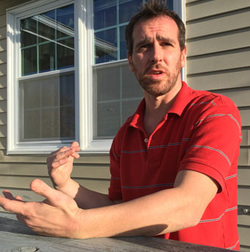 By Erin McAllister Gemeinschaft Home stands as the only offender reentry program in Virginia that utilizes the principles of restorative justice in every facet of its mission. Through a therapeutic approach that focuses on personal accountability, we seek to instill a sense of confidence and responsibility in ex-offenders and to equip them with vital tools to support their own wellbeing as well as to contribute to their families and community. Restorative justice is a fairly new concept that has developed over the past few decades, largely because of scholars such as Howard Zehr of Eastern Mennonite University, in Harrisonburg, Virginia. In the 1970s, Dr. Zehr operated a small halfway house, a time in which he observed many unresolved issues within the criminal justice system. He also identified certain aspects of crime that the highly punitive American justice system simply did not address. Such issues left victims without closure and offenders without accountability to their victims, diminishing the community as a whole. These circumstances have only worsened in recent decades, with a steady increase in rates of incarceration (and mandatory sentencing guidelines) particularly for non-violent crimes. Zehr believes that restorative justice offers a more productive tactic that benefits everyone involved in criminal behavior—offenders, victims, and the community. During a recent interview, Dr. Zehr explained that restorative justice is an approach to crime that is comprised of three principles: 1. Repairing the harm that is caused by wrongdoing (restoration); 2. Encouraging appropriate accountability for addressing needs and repairing harm; 3. Engaging those impacted by the wrongdoing, including the victim, the offender, the community. Zehr also emphasized that restorative justice is a highly adaptable practice, successful with individuals of any age, gender, race, etc., and helps to dispel the widespread myth that adult offenders are incapable of reformation. He also pointed out that research on restorative justice is very positive, as lower rates of recidivism (offenders who commit crimes and return to incarceration) have been reported widely in connection with restorative justice practices. Supporters of restorative justice still face the opposition of skeptics who push for harsher punitive measures and longer prison sentences for people who commit (non-violent) crimes. But the programs at Gemeinschaft Home provide an alternative path, one that leads to positive outcomes and supports individuals who seek to become healthy, productive members of the community.  Levar Stoney Levar Stoney By Latavia Taylor A 2004 graduate of James Madison University, Levar Stoney is a living inspiration. After completing his undergraduate degree in political science, he attended the Virginia Commonwealth University Minority Political Leadership Institute, finishing in 2006. Currently sworn as the Secretary of the Commonwealth of Virginia, since January of 2015, Stoney has made tremendous strides. Not only has he broken racial barriers, by becoming the first African American to be Secretary of the Commonwealth, he is also presently the youngest affiliate of Governor McAuliffe’s cabinet. Such accomplishments define Stoney’s success and offers inspiration for individuals of all ages and backgrounds. Before he became Secretary of the Commonwealth, Stoney was closely involved with the election campaigns of Terry McAuliffe. During this period he obtained the title of Deputy Campaign Manager for the 2013 gubernatorial election, and he continued to set records as he was the youngest state executive director of the Democratic party in the United States. In line with the mission of Gemeinschaft Home, Levar Stoney’s attitude and motivation to reach above and beyond the “status quo,” to achieve something greater, offers encouragement to individuals who have experienced hardships and substantial setbacks, giving them a sense of hope and a desire to persevere. We extend our gratitude to Levar Stoney who has accepted our invitation to give the keynote address during our annual banquet next April. Board member Kay Knickrehm initially approached Stoney about speaking at the event, because of his heavy involvement with reforming policies that concern restoring citizen rights for ex-offenders. Stoney’s continuous work to help a population that is oftentimes overlooked and disregarded resonates loudly with the goals of Gemeinschaft Home. In October of 2015, Governor McAuliffe assigned Stoney to lead Virginia’s efforts to streamline the process of restoring voting rights for convicted felons who have completed their prison sentence. He also co-chairs the governor’s commission that will review the Commonwealth’s policy on parole. Stoney emphasizes that, “We put ourselves up to be a first-class state, yet we have one of the highest rates of second-class citizens—one of the highest rates of disenfranchisement.” The banquet will raise funds for the organization as a whole, assisting with basic resident expenses, building improvements, and future projects. It will take place on April 22, 2016, at Park View Mennonite Church, in Harrisonburg.  Former resident, Daniel Farris Former resident, Daniel Farris By Latavia Taylor and Erin McAllister “Just take a breath”—four simple words spoken by the executive director that led a man consumed by fear and doubt to a life changing recovery. After an interview with Daniel Farris, a former Gemeinschaft Home resident who grew up in the Shenandoah Valley, it was clear that the impact of the program retained more than just a 90-day expiration and, instead, catapulted a lost individual into a new life. At his initial arrival at Gemeinschaft Home last summer, Farris expected nothing more than stale phrases of encouragement and superficial relationships with the staff and residents, but he discovered something very different. He discovered a welcoming and non-judgmental space for residents. Farris explains that “some people need someone to save them from themselves,” and he credits the Gemeinschaft Home staff for giving him the support he needed at just the right moment. Farris feels much gratitude for his relationship with the Gemeinschaft Home staff during his residency, saying, “The fact that the staff members are the people they are...that is a huge part of why this particular facility works the way it does.” He adds, “I mean you could throw grant money around and set up stuff like this all day long, but if you don’t have the right people and the right motives pushing the agenda, this doesn’t work.” He explained that with the guidance of people like Sharon (Ringgold), Richi (Yowell), and Jumar (Peterson), residents gain a fighting chance to alter their decision-making toward positive rather than negative outcomes and to lay the proper foundation to permanently separate themselves from the harmful habits and patterns of their lives prior to incarceration. After completing the 90-day program, Farris moved to Charlottesville and works as a groundskeeper for a local dance company. There is a clear sense of expectancy radiating from the former resident as he continues to work toward a future that includes stable employment and positive relationships with his family and friends. While he does not know exactly what the future may bring, he is sure of one thing: “If I didn’t have this [Gemeinschaft Home], I probably would have come back home and linked up with the same people I was with before., and who knows where I would be?” His gratitude and recognition of the significant role Gemeinschaft Home has played in his present circumstances demonstrates the strength of the program and the difference that it can make in many people’s lives. Gemeinschaft Home is a place that its residents will never forget. |
Archives
August 2023
|